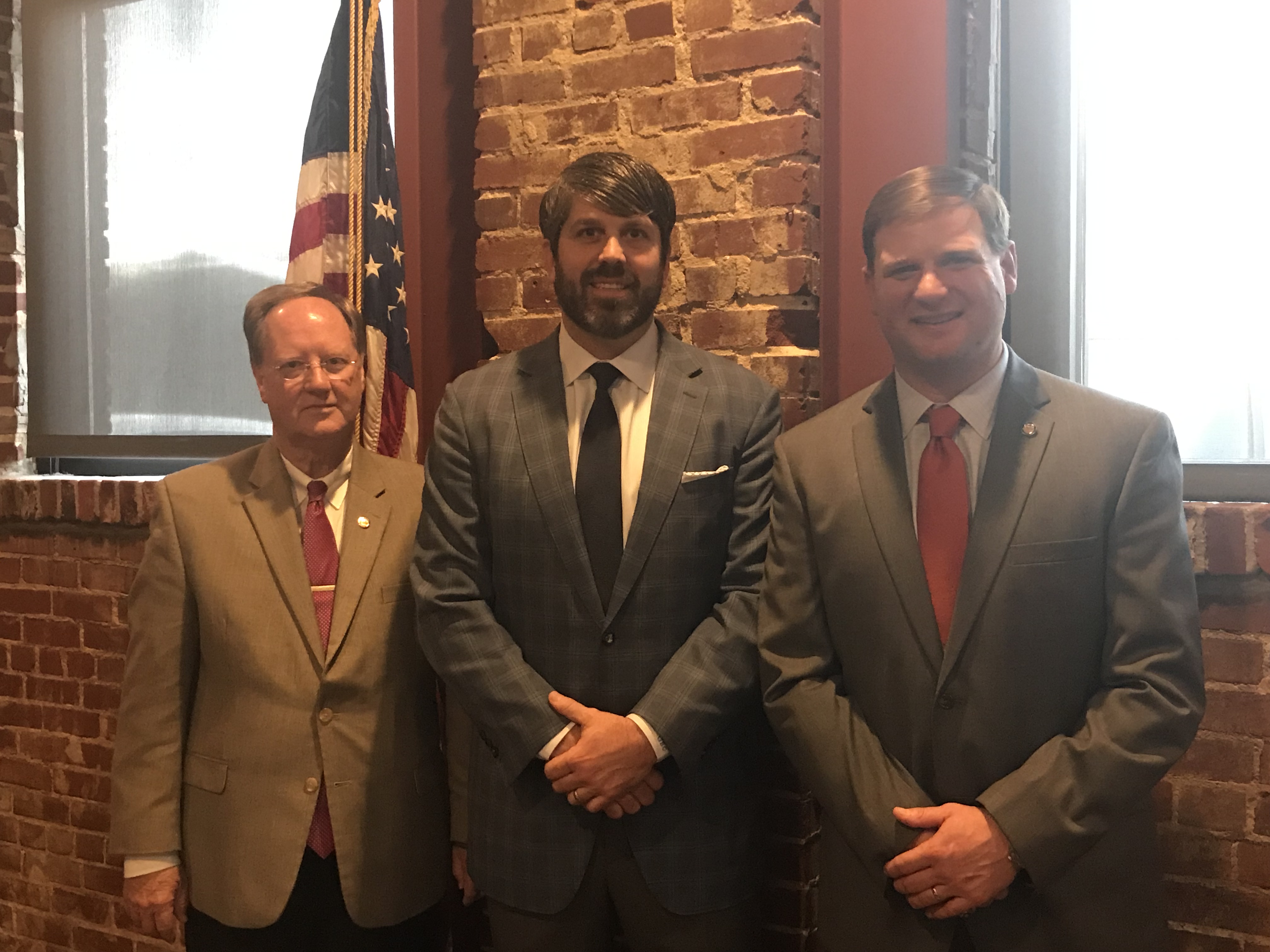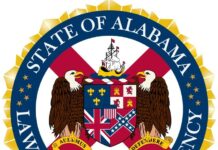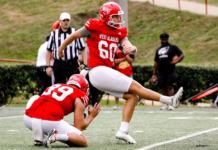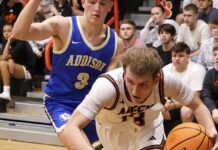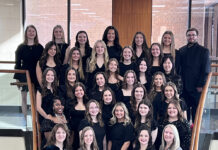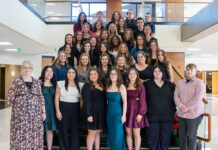Left to right, Rep. Randall Shedd, R-Fairview, Sen. Garlan Gudger, R-Cullman and Rep. Scott Stadthagen, R-Hartselle pose for a photo at Friday’s State of the State luncheon at the All Steak Restaurant in Cullman. (Christy Perry for The Cullman Tribune)
CULLMAN – The Cullman Area Chamber of Commerce on Friday hosted its annual State of the State luncheon, featuring members of Cullman’s state legislative delegation. Speaking were Rep. Randall Shedd, R-Fairview, Rep. Scott Stadthagen, R-Hartselle and Sen. Garlan Gudger, R-Cullman. Rep. Corey Harbison, R-Good Hope could not attend due to illness.
Business and community leaders joined local officials to hear the state delegation, including Cullman County commissioners, representatives for U.S. Rep. Robert Aderholt, R-Alabama, Cullman City Council, Good Hope City Council and others.
Shedd, who is serving his second term for District 11 began with a daily devotion, then shared, “A bulldog can whip a skunk, but it’s just not worth it. We have some issues coming up in Montgomery this year that whatever we do, we're not going to come out smelling like a rose, I can tell you that.“
He identified many of the biggest issues legislators will tackle this year, including: infrastructure, the gas tax, prisons and courts, school safety, the opioid crisis, Medicaid and rural hospitals, mental health care, ethics laws, lottery and gambling, economic development, regulations rollback and poverty prevention.
Shedd assured those gathered that he will remain focused on local projects and continue to work with mayors and local officials.
“We have to find a way to remove the barriers to the people in our state that are stuck in poverty. We will continue to advocate to save our rural hospitals. We will also promote broadband and high-speed internet across the state,” he said.
One of the pieces of legislation Shedd is working on is “requiring state agencies to have a plan to move up in the national rankings in their entity. Alabama is ranked number one in Pre-K and we need to see more no. 1 rankings of that nature.”
Shedd hopes to focus and have the revenue available for many area infrastructure projects. Those he hopes to see addressed are: Alabama Highway 69 from Arab to Cullman improved with passing and turn lanes and U.S. Highway 278 East from Cullman to Snead completed, including St. Bernard Bridge.
Shedd added, “Alabama and Tennessee need to work together closely with President Trump's administration to get I-65 in north Alabama and southern Tennessee ready for (the) Toyota/Mazda influx of opportunities.”
He also shared, “While Sen. Richard Shelby and (U.S. Rep.) Robert Aderholt are in powerful appropriation positions, Alabama needs to lay the foundation for high-speed rail and transit that Senator Shelby wanted a few years ago. The infrastructure legislation can't be just a gas tax increase. If it passes, it has to be fair and it must have a component that provides for electric and alternative fuel vehicles to pay a fair share, too.”
He continued, “Now, does Alabama need new revenue for roads and bridges? Alabama has 101,429 road lane miles; 75 percent rural lane miles, 25 percent urban. (There are) 16,129 bridges in Alabama. Who pays for our highways and bridges now?
“Of today's fuel tax revenues: Almost half (43 percent) is paid by trucking/business and industry. Almost one-fourth (23 percent) is paid by out-of-state drivers (not Alabama individual citizens); one-third (34 percent) is paid by Alabama citizens. Fuel mileage efficiency has caused revenues to go down, and the cost of materials and construction has gone up.
“ATRIP (Alabama Transportation Rehabilitation and Improvement Program) programs in Alabama in recent years paid for a lot of good highway projects, but that was bond issues or borrowed money and now that debt is coming due. That has reduced capacity funding (new lanes) to $45 million statewide; the Highway 157 project is $28 million. Over the past 25 years, vehicle miles traveled have nearly doubled with only a slight increase in lanes.
“The result is congestion. I'm not telling you I'm going to vote to increase gas taxes. I'm not saying now that I'll vote against it. I'm going to give you the information between now and the time it comes up for a vote and ask you, what would you do?”
Stadthagen, the newly-elected representative for District 9, followed Shedd, joking, “I’m a perfect example of a rookie versus a veteran in giving speeches.”
He continued, “Since we began our campaign 20 months ago, Cullman County has literally become our second home. The Cullman County delegation, we’ve got a good group.
“I believe true leadership is shown through example and not words and that’s how I take on this leadership role. I campaigned on town hall meetings and listening to my district. My Cullman County town hall will be in West Point at the Brandin’ Iron Feb. 5 at 6 o’clock. I’m not going to be preaching. We are going to sit down, roll up our sleeves, and discuss the issues we are facing that Randall was touching on.
“I want to hear where you stand, where our district stands, and that’s most likely where I’m going to stand, with the people I represent.
“I’m learning and it’s a lot to take in. I’ve learned my committees. I’m on boards, agencies and commissions, local legislation and state government. I’ve got a bill to help our state be more fiscally responsible. I think that’s where we need to start. We need to be more accountable and give incentives to save money for our state.
“If you need me for anything, call me. I’m a worker, and I’m here to work”
Gudger, who just began his first term in the Alabama Senate, said, “My job, along with my other colleagues, if we do our jobs, we are supposed to pass the bills that help enhance our community: our quality of life, our schools, our hospitals and everything that touches our daily lives in this community.”
Gudger said he is passionate about career technology in high schools and two-year colleges.
“We’re lucky that we have Wallace State,” he said.
Switching from focusing only on the city of Cullman as a Cullman city councilman to a broader focus as a state senator, Gudger shared that he’s having to learn how to work with people who are focused on different priorities. He’s focused on building relationships with his fellow senators.
“Having to sell bills and good ideas for your community (that don’t) always support other people’s communities is probably the hardest thing I’ve ever had to do. I ask for your prayers, I ask for your guidance and I ask for your friendship.”
The 2019 legislative session will convene on March 5.
Copyright 2019 Humble Roots, LLC. All Rights Reserved.

